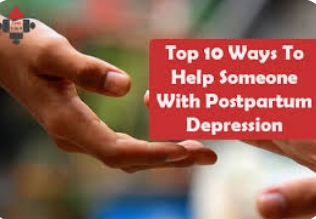Postpartum depression affects a significant percentage of new parents, and yet, this condition is not talked about enough. The lack of conversation alongside the associated stigma has a grave impact on people’s well-being.
New mothers are especially more prone to postpartum depression, a condition remarked by extreme blues, mood problems, sleep and diet issues, bouts of tears, sadness, and irritability for prolonged period.
Not only do postpartum depression symptoms take an extreme toll on the mental and physical health of the parents, but the baby is also highly likely to be affected by it.
Hence, everyone must know the symptoms of PPD, alongside normalizing having it and offering support to the affected people.
So, if someone around you is having postpartum depression, know that there are many things that you can do to help them through this tough time.
Helping people with postpartum depression
Do not compare to your experience
Comparisons are never healthy and are especially counterproductive in cases of PPD. So, make sure that you do not compare their situation to yours or trivialize their pain in any way, since this might add to their guilt and shame, making their symptoms worse.
Encourage them
Your loved one might be feeling guilty about parenting not coming naturally to them. Thanks to the false representation of life on social media, people are made to feel inadequate about their flaws. With parenting, the stakes are higher, so the impact on mental health is also greater.
It is therefore helpful to encourage their parenting efforts, praising their wins and shifting perspective on their mistakes.
Hear them out
Another way you can help your loved ones is by lending them your ear. Since talking is a cathartic experience, expressing their inner turmoil to you can thus be of benefit.
Furthermore, letting them talk can also make them feel less alone. Your being there to listen to them supports them. And, during your conversation, you can offer them wisdom and perspective that helps in improving postpartum depression signs.
Offer them support
New parents need a lot of support. Women not only have to tend to their bodies, but also take care of the baby, the house, and the family. Some might not be given sufficient maternity even. Similarly, new fathers also have a lot of pressure.
The fatigue, exhaustion and overwhelm can lead to a greater risk of postpartum depression. So, a helpful thing to do during this time would be to offer them your support.
Help around the house, cook a few meals for parents, take care of the baby while the mother rests, etc. These gestures can make a profound impact on the health of the parents.
Convince them to get professional help
Unfortunately, there are a lot of stigmas attached to seeking care for mental health problems. The situation is even more complicated with PPD, as there is added guilt about not being good parents.
Hence, you as a friend should help them get professional help. Normalize for them postpartum depression treatment and encourage them to seek the counsel of an expert. You may find great variety of experts for postpartum depression on fitcyhealth.com




